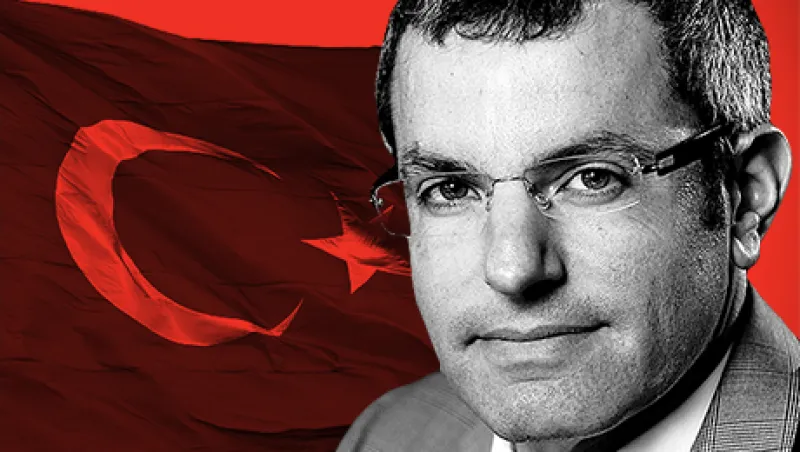Michael Harris directs the Renaissance Capital crew that takes top honors in Turkey Equity Strategy on Institutional Investor’s 2015 Emerging Europe, Middle East & Africa Research Team. While it’s RenCap’s first time at No. 1 in this category, the London-based leader — who joined the firm from Bank of America Merrill Lynch last year — is no stranger to the winner’s circle. Since 2002, Harris has racked up an astonishing 22 sector-topping appearances in the Emerging EMEA and predecessor surveys, as either leader or co-leader of teams covering Central & Eastern Europe, Middle East & Africa Equity Strategy; Emerging-Europe Equity Strategy; Middle East & North Africa Equity Strategy; Turkey Equity Strategy; and related categories.
The only currently ranked individual to have amassed more first-place finishes in an II research ranking is Evercore ISI’s Ed Hyman, now in his 35th year as champion of Economics on the All-America Research Team.
“Turkey’s elections are getting considerable attention, with market concerns ranging from either a destabilizing coalition or an overwhelming consolidation of [Adalet ve Kalkinma Partisi, or AKP] power,” Harris and his associates wrote in a note to clients in late May. “Should the Kurdish [Halklarin Demokratik Partisi, or HDP] surpass the 10 percent threshold, a four-party Parliament and an AKP vote below 44 percent means a coalition becomes likely. We say no problem. Unlike in the 1990s, we think, Turkey’s economy has matured enough to tolerate a coalition, especially one led by a dominant party.”
President Recep Tayyip Erdogan’s AKP earned roughly 41 percent of the vote in the June 7 contest; the HDP, about 13 percent. Now that the election outcome is known, II Director of Research Thomas W. Johnson asked Harris, 45, what investors should expect next — and how they should position their portfolios in light of the new political order.
Were you surprised by the outcome of the election?
Our base case was a four-party Parliament on the simple premise that the HDP’s Selahattin Demirtas had received 9.8 percent of the vote in the August 2014 presidential election, when turnout from opposition voters was some 3 million lower than in the March 2014 local elections. This left us thinking that the HDP would get a disproportionate share of the incremental vote to push it above the 10 percent threshold required to win parliamentary representation.
That said, we were surprised how low the AKP vote fell, as we were thinking it would be flirting with the 43 to 44 percent threshold that would still have allowed it a small single-party majority. We’d focused on the HDP winning over secular voters, but it seems it won more votes from the AKP than we’d anticipated.
Regardless, our thesis was that the AKP’s position would not be strong enough to force through a lopsided new constitution to consolidate power under an executive presidency. That’s a clear result of this election.
If Erdogan is unwilling or unable to form a coalition in the coming weeks, he may call for a snap election. Do you think this is likely?
We think a snap election is unlikely, as we expect most parties understand that the Turkish electorate has consistently demonstrated its displeasure with instability in every vote since 1999 — and this time was no different. In 2002 the protest vote rallied to the untested AKP and it won more converts, as it was clear the party offered stability and growth; however, in this election it seemed the swing vote didn’t want to risk the uncertainty associated with efforts to consolidate executive power under President Erdogan. We expect the key parties understand that if they are viewed as the stubborn cause of having to go to a new election, they would risk being punished by voters in that election.
While some would argue that the AKP would embrace an opportunity to blame the opposition for a failure to form a coalition, to us it would seem a damaging strategy to face the electorate so soon after its change in leadership and the deterioration in its popularity. Accordingly, our message is that the AKP has a vested interest in forming a government in order to avoid a new election. It also helps that a non-AKP coalition is almost unthinkable, as it would need to include both the Kurdish HDP and the nationalist [Milliyetçi Hareket Partisi] — which are almost polar opposites in terms of ideology.
You have said that “political calm should be enough to restart the cycle” of sustainable economic growth. Is such a period about to begin, or does more uncertainly lie ahead?
If we’re right that we’ll get a coalition, we think the cyclical turning point is close. If another general election can be avoided, we should now be at the end of a polarizing election cycle that has dominated Turkey for most of the two years since the Gezi Park protests. If so, the markets should calm substantially and the real economy should begin to recover — all the more so as the market’s biggest fear has been political interference with the central bank, while the biggest worry for the real economy has been the loss of checks and balances and threats to the rule of law associated with a consolidation of power. Under a coalition, we think, both these risks should fade substantially.
As regards the central bank in particular, we already had a sense from its last monthly meeting that the monetary policy committee was contemplating some degree of postelection return to orthodoxy. This election result makes that market-friendly possibility substantially more likely — and it also significantly reduces the risk associated with the government’s choice of the next central bank governor, in April 2016.
Crucially, if there is ever going to be proof that Turkey has matured democratically and economically, it will be demonstrated through an ability to be effectively governed via a coalition, and in particular one led by a majority party with which historically the establishment parties would have refused to cooperate. This next government will be a litmus test for Turkey — one we think it will pass.
What advice are you offering to clients?
We expect both the real economy and the financial markets will respond well to the formation of a new government. With low oil prices and the Turkish lira weak, fears associated with the U.S. Federal Reserve and the current account look to us more sentiment- than fundamentals-driven. Valuations for the banks, in particular, have historically been cheaper less than 10 percent of the time on a price-to-book basis. We can see a strong case for Turkish equities to swing from one of the world’s worst performers in the first half of the year to one of the best in the second half.
What do you enjoy most about covering Turkey? What do you find most challenging?
Like any analyst, I enjoy the sound of my own voice, so I love the fact that Turkey gives me so many political, geopolitical and economic reasons to pontificate. I also love having a platform to try to help investors and the market better understand the nuances, complexities and strengths of Turkey, which are often contradicted by headlines. There is no better example than the markets’ short-term fear of the lack of clarity from this election result versus my belief that this election is fundamentally beneficial, as it can move Turkey beyond the previously rising structural political risks. That’s what I love most about my job, but it’s also a tall order and, accordingly, it’s also the most challenging part of my job.
Get more on our research and rankings.






